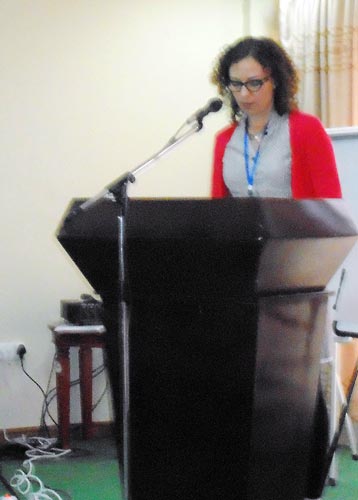By Adefris Teklewold and Dagne Wegary
Developing Ethiopia’s seed sector can help bring quality protein maize (QPM) to people at risk of protein deficiencies, participants in a seed production training course learned last month. To enhance the skills of public and private seed company agronomists and seed quality inspectors, the Nutritious Maize for Ethiopia (NuME) project hosted a QPM seed production training course from 30 October to 1 November. With funding from the Department of Foreign Affairs, Trade and Development (DFATD) of the Canadian International Development Agency (CIDA), NuME aims to bring QPM to farmers in the major maize-growing areas of Ethiopia. Seed sector capacity building is a key component of the project, along with advancing and sharing QPM technology.
Fikre Markos, plant health and regulatory director of the Federal Ministry of Agriculture, said the seed system in Ethiopia remains underdeveloped. “The country’s seed companies are inefficient due to capacity limitations and can benefit from training for seed technologists,” he said. Nearly 40 participants – including five women – attended the training. Seed agronomists represented seven private seed companies, four public seed enterprises, and one farmer cooperative union, while seed quality inspectors were drawn from the Federal Ministry of Agriculture, three regional bureaus of agriculture and three zonal seed quality laboratories. Four agricultural research institutes producing breeder, pre-basic and basic QPM seed varieties were also represented.

Jennifer Bloom, second secretary for food security and agricultural growth for DFATD, opened the workshop and commended CIMMYT for bringing relevant partners to help implement NuME.
NuME Project Leader Adefris Teklewold said the project is aligned with the government of Ethiopia’s growth and transformation plan and millennium development goals. The NuME project focuses on gender parity in achieving these goals. Women are targeted in the project’s education and communication efforts to identify ways they can benefit from QPM. “The project addresses the issues of food and nutritional security and also focuses on promoting and ensuring gender balance and opportunities for women,” Teklewold said. “Through disseminating QPM technology, the project aims to support stakeholders’ efforts to challenge intra-household power imbalances.”
Presentation topics included clarifying the difference between QPM and non-QPM germplasm; QPM variety development and promotion; identification and maintenance of true-to-type varieties and parental lines; effective planning of QPM seed production; field management of seed production; post-harvest handling and marketing and principles of seed quality control and inspection. QPM contains higher levels of essential amino acids than normal maize. The QPM trait is recessive, meaning seed production requires careful quality control so the trait is not lost.
The trainers–experts drawn from CIMMYT, the Agricultural Transformation Agency of Ethiopia, the Ethiopian Ministry of Agriculture, Ethiopian Institute of Agricultural Research, Sasakawa Global 2000 and Ethiopian seed Enterprise – brought a wealth of information and knowledge to improve the skills of seed technologist and quality inspectors.
Participants said the training would benefit their personal careers as well as help them meet NuME’s high-quality seed production objectives. The training not only enhanced their knowledge of QPM seed technology but gave them insight into its role in food and nutrition security, they said.
Markos presented certificates to the participants and closed the training by saying the private sector is crucial for varietal development, seed production and dissemination and asked participants to use the training to improve QPM seed production and quality control in Ethiopia.
 Capacity development
Capacity development 
